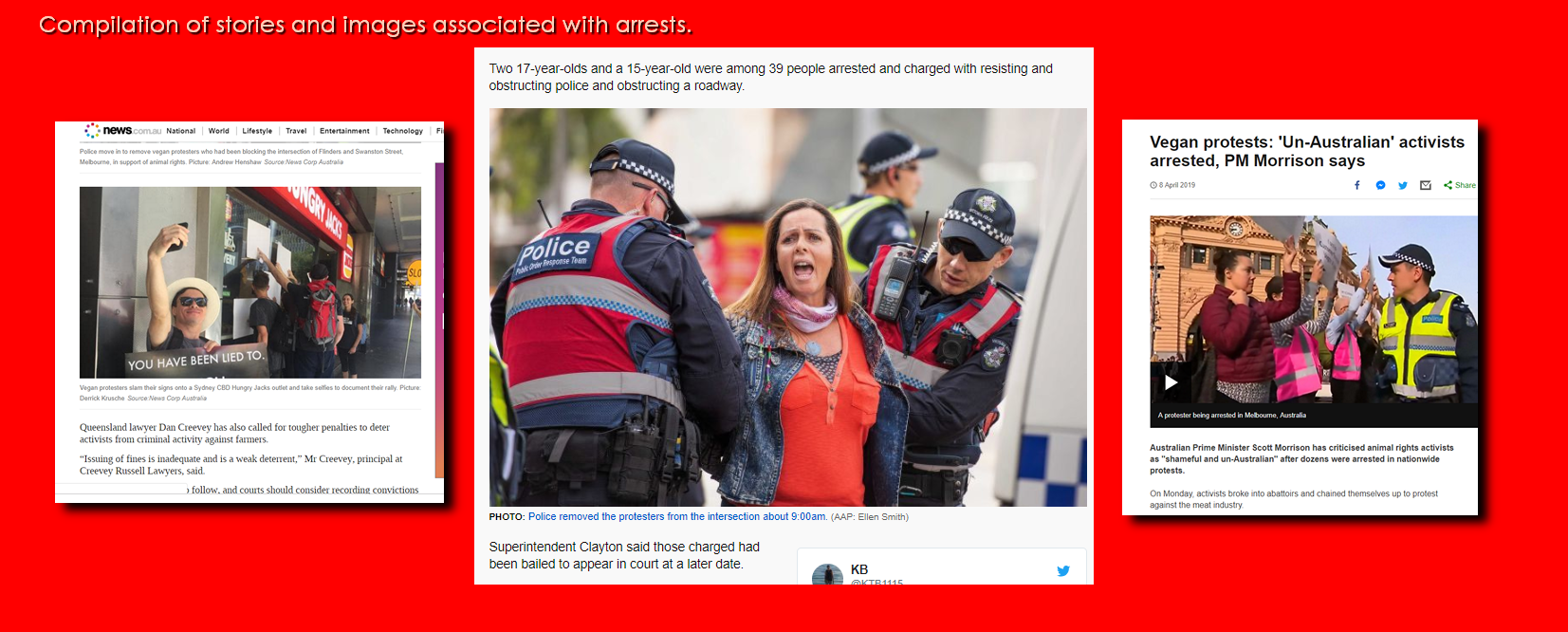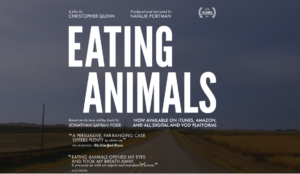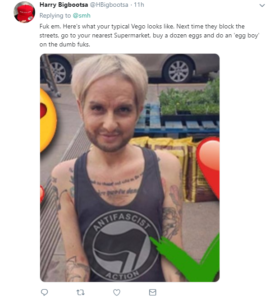Communication comes in many forms. Protesting is one way to get attention, but is it the most effective one, when all is said and done?
Melbourne Vegan Protests (April 2019): Arrests and Charges
Stopping Traffic vs Stopping Suffering: How Vegan Activism Crossed the Wrong Side of the Tracks
Vegan protests and arrests and charges in Melbourne in April 2019
- In April 2019, a group of Vegans chained themselves to vehicles – and each other – in the middle of a busy intersection during the morning rush hour.
- They completely disrupted the central business district of Melbourne, Victoria, Australia.
- People couldn’t get to their offices. Trams were halted in their tracks, and the flow-on traffic jam effects disrupted surrounding suburbs.
- Even emergency personnel were said to be unable to get to where they were needed to be.
- At the same time, activists in other areas entered farming properties and made demands.
- Yes, they brought attention to the plight of suffering animals — and later, an excellent piece on horse-racing came to light on the ABC.
- But is protesting always the way to go? I think the answer is NO.
- While protesting in numbers brings attention to a cause — there are other powerful ways to communicate.
- There are thousands of ways to protest, and the use of music – much like Bob Dylan and others did to protest the Vietnam was – is being overlooked for the joy of ‘madly gathering in close proximity’ and disrupting healthcare workers, hospital teams, and other front-line workers, to make a point that could be made much more powerfully through videos, music and films.
- And the risks of protesting, to the protestors, police and other members of the public, is often not worth it.
In my view, try something else instead – a viral video, news story, poetry, sarcastic humour and/or song. Yes, this may date me, but think Bob Dylan as an early example of protest songs. There are many other more modern examples.
- Here’s my snapshot of what I thought of the protects in April 2019 in Melbourne.
- And why I think that — in general — protests are NOT always the way to go.
Greta Thungberg – by making a passionate speech on climate change at a very public forum (the “how dare you” speech) – brought greater public awareness and unified demand for change than any of the protests, combined.
The chaos of vegan protests (Melbourne, Australia in April 2019)
It was chaos, but more than that, it was a demonstration of the frailties of misguided activism, by people who were either ill-advised – or most likely, completely unadvised.
Over 39 people were removed and arrested during this vegan protest. They now face potential jail times of up to 5 years for their crimes, and fines up to $500,000.
Who organised this chaos?
While their hearts are definitely in the right place – awareness-building – It was wrong on far too many levels, and did more harm than good.
And although their hearts were in the right place – wanting to improve the lives of animals in Australia and beyond – they went about it the wrong way. Instead of being helpful, they’ll soon be locked up in jails, and further hated by the broader public. A public who never was fond of their radicalised approaches or extremist viewpoints; even if their hearts meant well and even when they have good cause to raise alarms.
They just lost any remote chance of public support they were hoping to gain – whoever the ring leaders were, they were incredibly misguided.
Yes, Melbourne’s vegan protestors just lost a chance to bring the attention of a larger public to their insights. A public they could have far better informed. A public they could have engaged to help create better SYSTEMS in farming, more humane checks and balances, to reduce animal suffering – rather than taking an extremely radical, with no chance-in-hell in succeeding, approach. What a loss…to an essentially worthy cause of wanting to protect the vulnerable and eliminate suffering.
But stopping traffic isn’t going to stop suffering. It only makes those who could help, more resistant to change.
So yes, they lost a chance to gain public support. A broader public who already have stereotyped Vegans’ as using radicalised, preachy communications to get their messages across. A pubic they needed to inspire to assist in their efforts, rather than criticise, condemn or blame. And they need the support of the public to help stop suffering, through enabling more humane farming solutions, not eliminating all farming altogether in one fell swoop. So yes, they mean well, but they aren’t exactly known for building effective change alliances. Then again, neither are others in the industry.
What’s needed here is COLLABORATION instead of condemnation, INSPIRATION instead of outrage, and INSIGHT into factors of social change. Sure, it’s easy for people to tune out to your messages. But if so, make them so inspirational they don’t. Think Martin Luther King’s speech “I have a dream” and his famous quote, “Our lives begin to end the day we become silent about the things that matter.”
- Preaching isn’t going to change an ingrained lifestyle and meat-eating culture overnight.
- If activism has a chance of succeeding, I say to those who care – never remain silent. Use your voice for change. In the words of Martin Luther King, our lives begin to end the moment we remain silent
- But when protests and activism have no chance of changing the world in our lifetime – I say, do what you can to end suffering.
- Do what you can to REDUCE suffering, in one area, in one lifetime – yours and mine.
And all that bail money and lawyers fees? They could have used it for a different type of campaign.
A more thoughtful and collaborative approach…perhaps they have tried over the years, and their attempts fell on deaf ears, or industry related ignorance.
I don’t really know, I haven’t explored this but assume – and hear – the industry leaders told them to step aside.
But I do know this: they went about their protest in the worst way possible. And hence, they harmed their cause.
Sure, they were tired of having little effect. But stopping traffic in an attempt to stop suffering doesn’t work.
Videos of animal suffering lose their power also, as people tune out. People gaze lovingly into their pet’s eyes, and would take a bullet to protect their pets or go to jail to protect them – while chomping into a lamb chop, steak or pie.
What works, the only thing that has ever worked for global changes – is awareness first, collaboration second, and solutions third. And you can’t typically tilt the world on its axis in one day. Even if enough people gather in one place, glued firmly to a sidewalk, a tank, a bobcat…or marching towards town hall.
(c) 2019 All rights reserved. Connie May MHST
That’s not to say become resigned, that’s to say that ONE GENERATION CHANGES projects have a better chance of making a difference. And that extremism in all its forms is a barrier to success…
Sadly, for many vegans – with their hearts in the right places and their mouths to follow – have never learned the art of subtle, yet effective, change management and engagement strategies.
- They’ve failed to shift others to the degree they’d hoped.
- In part, this outcome is because of the massive size of the cultural shift they’re wanting. Plus, they’re trying to do it all at once.
- There’s also the fact they’re communicating in ways that aren’t working.
This is RISK of the most passionate protestors. Their passion is the fuel that energizes them to try to change the world. But it’s also the rocket fuel that explodes on them, and destroys them when they start making ill-informed protests or getting preachy instead of helping with the 3 crucial elements I mention above: awareness, collaboration and solutions.
Because they’re failing at both awareness and collaboration – by not increasing awareness and not applying the right type of influence (social pressure) in the right way – there’s no current hope of a solution that will minimize the suffering of animals in stress. They could, if they were more informed — using the real power of social voice change communications — be doing so much more.
Do animal rights protests and other activism, aimed at protecting farm animals, justify their crimes?
Admittedly there IS a lot of cruelty in the animal farming industry (but that is NOT all farmers, and that must always be remembered). I have friends who are farmers. I have friends who are vegans, vegetarians, pescetarians, and meat-eaters. I personally have the book by Jonathan Safran Foer called Eating Animals, and I have seen the film by the same name.
I made sure to see that film at the Melbourne International Film Festival (MIFF) in 2018.
I also know that Paul McCartney is an amazing activist for animal-free (vegetarian and vegan) diets. I too tried to be vegetarian (but never as rigorously devoted as a vegan). That’s been an off-and-on-again thing for me for several years. But I am not currently a vegetarian – my body didn’t respond well. Nutritional balance issues were of concern and I couldn’t get the more-purist eating regimes to work well for my body.
That’s not to say that every time I see an animal being transported, or anytime I see these on the menu, I feel torn between my love for animals and my own nutritional needs and preferences, and my diet is predominantly 90% vegetarian (yet with dairy, so purists might readily disagree and I see their point — I’ve seen how some farmers treat their cows, and how they keep them in a perpetual milk-producing state that isn’t healthy or sustainable).
Oh, and about 50% of that is chocolate (dare I say)!
Film link: https://eatinganimalsmovie.com/
Before I go further into my views on the subject of effective communication and how they went wrong (and what others need to learn from their mistakes), here are a few personal disclosures.
Overall, in my diet, I eat a lot of vegetable-style soups. I DO eat meat, but not a lot, not often (I’m also NOT a chef, nor foodie of any sort). I definitely consume dairy (mostly, milk in coffee). I know the harms of modern soy milk to people’s health and hormones. I personally wouldn’t touch soymilk with a 100-meter pole! So I am predominantly pescatarian, but eat little fish as well, and still suffer some level of guilt whenever eating something that was once alive — including plants!
I tended to rely heavily on eggs, milk, and fish, however. I buy eggs from a local free-range farmer when I can, but I suspect the restaurants I frequent are unlikely to serve those types of eggs.
I do, however, very much admire those people doing sustainable, happy-pig style farming; and those who manage to live a meatless and fishless life, I admire even more.
Some modern-day farmers aim not to change the world’s longest ingrained cultures, but to make the animals they’re caring for have a happier life, a more natural free-roaming grazing lifestyle, and a less-suffering end. (c) 2019
And let’s face it – it’s the industrialization of farming – especially in relation to a serious overpopulation problem that should be everyone’s concern – that has led to the degree of animal harms in the first place (and profitability and market pressures). There are many systemic and inter-related issues to consider. Overpopulation being one long ignored factor, traffic congestion another (where were all the bicycles, and what’s up with the rented vans?), food modifications and nutritional effects yet another concern. Sure, the relationships between animals and people DO need to change, and some of what’s going on IS alarming.
But if you want to inspire change, you’ve got to be selective.
Not only in what you’re seeking to influence, or change, but in how you’re approaching it from communication and timeline perspective.
One generation changes are where it’s at – what you can REALISTICALLY achieve in one generation, for ours and the one that’s next. And that is NOT going to be completely modifying all human eating habits, in a single protest..or using preachy, hostage-taking approached. Don’t stop, of course – just do it BETTER, and aim for one major accomplishment at a time – not a drastic flip-around.
So don’t stop trying to make things better, but go about making things better in a better way.
Ignorance has allowed the harms to persist; but raising awareness in the wrong way won’t help anyone change anything. It just ingrains the differences.
My personal thoughts are this. I often feel torn about my own diet, although I limit my animal meat intake quite extensively. Give me a healthy non-diary alternative that works, and is affordable, I’d take it. I don’t think I can go completely off having some animal proteins or fish in my diet (mostly fish) as I tried that for years, and had some serious health repercussions due to nutritional deficiencies from that sort of diet (scientific articles below); but this article isn’t about me…those are just my disclosures.
This article is about how the Vegan Protests in Melbourne went wrong, and what other activists and protestors can learn from their mistakes. And also, some links to the pros and cons of vegan and vegetarianism from some reputable sources (yes, the medical pros, not the radicalised hearts we saw in the middle of the CBD).
Again, they meant well…their intent was to protect the vulnerable. They just went about it the wrong way.
Are acts of animal rights and farming protesters justified, or not? Does the cause justify the means?
The answer is no, it does not. Yes, things DO need to change.
Suffering is at far too high a level throughout the industry (watch the DOCO film featuring Natalie Portman).
But the response from Australians – at all levels of influence – was solidly AGAINST the Vegan groups’ extremist approaches. There was so much push-back to their radicalized messages – and traffic-stopping antics – they lost a lot of potential support for their concerns. Not to mention, they fed RIGHT into the stereotypes and viewpoints of the conservative shock-jocks and died-in-died-wool-politicians who recognize CLEARLY that farmer support, and economic considerations is far more ingrained in Australia’s culture than animal rights will ever be in any of our lifetimes.
Why did they lose so much potential public support?
- One, because it was an extreme, ill-conceived approach.
- Two, because there are other ways in which to inspire change, versus demand a cultural change so huge there is zero chance of it happening in one generation’s time (if it was, I’d be in there, helping).
- Three, because they never had much support, to begin with, and that’s partially due to people closing their eyes and ears, partially due to cover-ups in related industries, and partially due to the fact they never learned how to master influential communication skills.
The fact is, that the cultural demand for animal farming is never going to end overnight, no matter how much anyone wishes that would happen.
Instead, they needed to work to gain some change influence; respectfully, intelligently and with professional advice. Radical approaches rarely ever work…not even for the Sea Sheppard… it takes time. It takes doing things the best way possible to INSPIRE change, and to INFLUENCE change, while staying out of harm’s way yourself (e.g., out of jail or protest fines).
These vegan activists wanted to stop suffering. Instead, they stopped traffic. And they lost a million kilometres of empathy, compassion and respect while doing so. It not only didn’t help their cause – it harmed their cause, tremendously.
Was there a better way? Yes, and no.
Yes, in a sense, there was. Everyone who actually does witness the cruelty to animals that IS a regular occurrence, and built into the systems of mass-scale farming, would be alarmed. But again, it’s not EVERY farmer, it’s not EVERY place of animal care. But that said, it’s an industry-wide concern and issue.
And no, there isn’t really going to be anything that will change habits, industries and nutritional dependencies that evolved over so many years.
But there is ONE thing that could have been achieved – and which might still be achieved – and that’s enlightenment, and a reduction of cruelty in the animal farming and husbandry industries.
So awareness is the first step. But sitting on the steps of Flinders Street Station, chained to rented vehicles, isn’t going to help.
It’s only going to incur the wrath of the public and solidify the stereotypes of the Vegan’s that has long been a detriment to their cause.
To comment on this article, respond to my Twitter post.
Also, here are the articles on Vegan and Vegetarian Diets.
Be sure you watch the film though: Eating Animals (Natalie Portman) based on Froer’s book.
Scientific Articles about Nutrition and Vegan Diets, Vegetarianism
This is not a complete list of scientific references as meat, and some aspects of meat and dairy farming, are not considered healthy. Neither, in my view, is soy milk – that’s something to be very wary of using and to do your research re hormonal disruptions and GM soy (and no, soy candles are NOT safer than other types, in fact, they’re toxic!).
https://www.health.harvard.edu/staying-healthy/becoming-a-vegetarian
https://academic.oup.com/ajcn/article/89/5/1627S/4596952
Best articles about the nutritional effects of a Vegan diet or Vegetarianism:
https://medium.com/@Kahn642/10-important-plant-diet-vegan-research-studies-of-2018-15841245cdb7
https://www.ncbi.nlm.nih.gov/pmc/articles/PMC6235058/
Effectiveness of plant-based diets in promoting well-being in the management of type 2 diabetes: a systematic review
Vegan diets: practical advice for athletes and exercisers
News articles on the Vegan Protests and Arrests | Melbourne 2019
Most popular news stories and media releases on the Vegan Protests in Melbourne including Arrests and Charges (April 2019)
40 people charged with more than 120 offences following vegan protest in CBD
https://www.thecourier.com.au/story/6006138/forty-melbourne-vegan-protesters-charged/
https://www.bbc.com/news/world-australia-47848674
https://www.sbs.com.au/news/melbourne-vegan-protesters-face-up-to-five-years-jail-time
(c) 2019 All rights reserved.
First published in April-May 2019. Page updated January 2, 2020.






 1
1